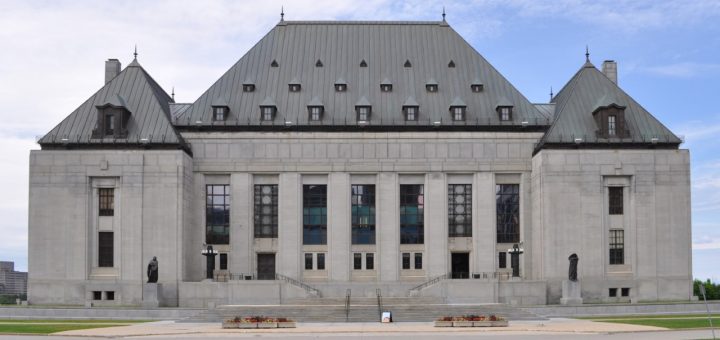R. v. C.P.: s. 37(10) of the Youth Criminal Justice Act Deemed Constitutional

On May 7, 2021, the Supreme Court of Canada (“SCC” or “the Court”) released the decision of R. v. C.P., 2021 SCC 19 [C.P.]. In the decision of C.P., the Court was tasked with ruling on the constitutionality of s. 37(10) of the Youth Criminal Justice Act, S.C. 2002, c.1 [YCJA].
Facts of the Case and Trial Decision
When the accused (“C.P.”) was 15 years-old, he attended a friend’s birthday party at the beach. The complainant, R.D., also attended the aforementioned birthday party. Both the accused and the complainant were drinking at the party. The accused was charged with sexually assaulting R.D. (C.P., paras 6-7).
At trial, the Crown argued that C.P. had sexual intercourse with R.D. despite knowing that she was too drunk to have the capacity to consent. C.P.’s defence argued at trial that R.D. had consented to having sex with C.P. before there were any signs that she was too intoxicated to be capable of consenting. However, the trial judge rejected the defence’s evidence and held that R.D. was too incapacitated to be capable of consenting (C.P., para 18). Ultimately, the trial judge found C.P. guilty of sexual assault (C.P., para 22).
Ontario Court of Appeal Judgment
C.P. appealed the trial judge’s ruling to the Ontario Court of Appeal, where C.P. argued that the trial judge’s ruling was unreasonable. The majority decision at the Ontario Court of Appeal dismissed C.P.’s appeal because the trial judge’s reasoning resulted in a reasonable verdict (C.P., para 23). There were no errors committed by the trial judge with respect to the evidence presented by C.P. or the application of the law (C.P., para 23). Justice Nordheimer, writing in dissent, would have allowed C.P.’s appeal because “proof of the offence beyond a reasonable doubt was not an available verdict” when reviewing the evidence altogether (C.P., para 24).
In accordance with s. 691(1)(a) of the Criminal Code, RSC 1985, c. C-46 [Criminal Code], C.P. filed a notice of appeal. s. 691(1)(a) of the Criminal Code states the following:
“A person who is convicted of an indictable offence and whose conviction is affirmed by the court of appeal may appeal to the Supreme Court of Canada on any question of law on which a judge of the court of appeal dissents” (Criminal Code). In this case, if the accused were an adult, this route of appeal would have been an option. The accused would qualify for an automatic right to appeal on a question of law because the accused’s appeal was dismissed at the Ontario Court of Appeal and there was a dissenting judgment, namely, Justice Nordheimer’s dissenting judgment.
However, s. 37(10) of the YCJA disputes this and states the following:
“No appeal lies under subsection (1) from a judgment of the court of appeal in respect of a finding of guilt or an order dismissing an information or indictment to the Supreme Court of Canada unless leave to appeal is granted by the Supreme Court of Canada” (YCJA).
Therefore, pursuant to s. 37(10) of the YCJA, young offenders do not have an automatic right of appeal, which means that leave is required.
The Supreme Court of Canada’s Ruling
On appeal at the SCC, the accused challenged the constitutionality of s. 37(10) of the YCJA, arguing that s. 37(10) of the YCJA is in breach of s. 7 and s. 15 of the Canadian Charter of Rights and Freedoms [Charter].
In their minority judgment, Justices Abella, Karakatsanis and Martin laid out the two step test for a s. 15(1) Charter claim, where the first step requires demonstrating that an impugned law “on its face or in its impact, creates a distinction based on enumerated or analogous grounds” (C.P., para 56). The second step of the test requires establishing that an impugned law “imposes burdens or denies a benefit in a manner that has the effect of reinforcing, perpetuating, or exacerbating disadvantage.” (C.P., para 56). The Crown and the Defence are in agreement that the first step of the s. 15(1) test is met, namely that there is a clear distinction between the appeal rights to the SCC available to adults and young offenders.
Justices Abella, Karakatsanis and Martin held that the second component of the s. 15(1) test was also met, ruling that s. 37(10) of the YCJA is unconstitutional because young offenders not having an automatic right to appeal amounts to the “denial of a procedural benefit that perpetuates and reinforces their inherent vulnerability in the criminal justice system” (C.P., para 99). However, Justice Kasirer agreed that while s. 37(10) of the YCJA is in breach of s. 15 of the Charter, Justice Kasirer held that the provision can be upheld by s. 1 of the Charter and is therefore constitutionality valid (C.P., para 167).
Chief Justice Wagner, writing for the majority decision, along with Justices Moldaver, Brown and Rowe, held that s. 37(10) of the YCJA was not in breach of s. 15 or s. 7 of the Charter. In order to establish a s. 7 violation of the Charter, the majority decision reaffirmed that it requires demonstrating two elements: “(1) that the impugned law or government action deprives the claimant of the right to life, liberty or security of the person; and (2) that the deprivation in question does not accord with the principles of fundamental justice” (C.P., para 125). While the majority found that the first step of the s.7 test was met, the second part of the test was not met because the leave process is quite “rigorous” (C.P., para 137). The fact that no automatic appeal mechanism exists for young offenders does not amount to a miscarriage of justice because of the SCC’s thorough leave process and because the current youth justice system provides “young persons with enhanced procedural protections commensurate with their unique circumstances and inherent vulnerability in the justice system” (C.P., para 138). Therefore, the majority held that there was no s. 7 breach. With respect to the s. 7 Charter challenge, Justice Kasirer also held that there is no breach of s. 7 in the case at bar.
The majority decision also held that s. 37(10) of the YCJA was not in breach of s. 15 of the Charter because in denying an automatic right to appeal to the SCC to young offenders, “Parliament did not discriminate against them, but responded to the reality of their lives by balancing the benefits of appellate review against the harms inherent in that process” (C.P., para 162). Therefore, the majority decision dismissed the appeal.
In a dissenting judgment, Justice Côté held that it was “not necessary to answer the constitutional questions pertaining to the validity of s. 37(10) of the YCJA, because they are now moot” (C.P., para 303). In Justice Côté’s view, since the SCC granted leave to appeal, it was unnecessary to undergo a constitutional analysis of denying an automatic right of appeal because the appeal was already granted and would not affect the case at bar.
Commentary
The automatic appeal rights available under s. 691(1)(a) of the Criminal Code permits any adult who is convicted of an indictable offence and whose conviction is upheld at a Court of Appeal to appeal that decision to the SCC on a question of law if there is a dissenting judgment at the Court of Appeal. This has long been recognized as safeguards to prevent any miscarriage of justice and prevent wrongful convictions. If there is any doubt left on a question of law at the Court of Appeal, this means that it is important for there to be a final verdict on the issue at the SCC. While this provision does not provide any guarantee against a miscarriage of justice, it provides individuals with the opportunity to have an automatic right to appeal their case at the SCC.
As stated in the C.P. decision, the SCC has “repeatedly recognized that young people are distinctively vulnerable in the criminal justice context” (C.P., para 79). This means that they require the same protections in the criminal justice system as adults, if not any additional protections. Young offenders are particularly more vulnerable than an adult accused, which warrants important procedural protections. The majority decision in the case of C.P. fails to recognize the disproportionate impact faced by young offenders who do not have automatic right to appeal under s. 691(1)(a) of the Criminal Code, which adults do.
As it was eloquently described in Justices Abella, Karakatsanis and Martin’s judgment, the “very philosophy and purpose of the YCJA, with its emphasis on providing substantial procedural protections for young persons, argues for procedures to prevent the ultimate disadvantage, namely, a wrongful conviction” (C.P., para 91). As a result of s. 37(10) of the YCJA, young offenders do not have an automatic right to appeal and leave is required. The very essence of what the YCJA purports to achieve, namely to provide procedural protections for young offenders, is not achieved by s. 37(10) of the YCJA.
In ruling that s. 37(10) of the YCJA is constitutionally valid and not in breach of s. 7 or s. 15 of the Charter, the majority decision falls short in recognizing that young offenders are not receiving the same benefits that those in the adult criminal justice system receive. As it stands, young offenders face an additional burden as they must seek leave to the SCC if they seek appeal of a decision. While some may argue that the appeal process can be a long and difficult process, especially for young offenders, this must be balanced with a young offender’s right to receive the same benefits as an adult accused.








Join the conversation